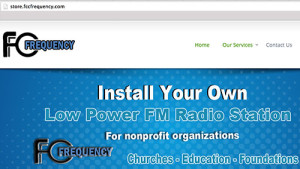The Commission issued a citation and order (PDF) to a company called FCCFrequency for “marketing unauthorized radio frequency devices,” otherwise known as FM radio transmitters that are not approved by the FCC. A citation is not a fine, but rather a stern warning to the company to stop selling these transmitters or it risks future fines.
According the FCC, the Enforcement Bureau’s Los Angeles Office received reports that FCCFrequency “was selling non-certified low-power FM radio transmitters for use in low power (LPFM) radio stations.” The Bureau also found that the company’s staff was installing transmitters for use by unlicensed individual and entities.
One station was discovered in Arleta, California, where the operator told the Commission that the transmitter, manufactured in the Dominican Republic, was purchased from FCCFrequency for $6,023.75. That station was issued a Notice of Unlicensed Operation on August 6. The Bureau likely worked backwards from there to identify FCCFrequency.
All radio broadcast transmitters for use by licensed stations must be what is called “type accepted,” which means approved by the FCC for use. A station that is licensed but uses a transmitter that is not type accepted is at risk for action and fines from the FCC.
With so many new LPFM stations coming on line in the next few years, it is a real concern that unscrupulous or clueless equipment sellers may offer unapproved transmitters to unwitting new stations. In this case FCCFrequency explicitly appeared to be marketing its unapproved transmitters to LPFM stations, with prominent graphics and text about the upcoming license window on its website. When new stations build out their studios and transmission equipment they must make sure to purchase equipment from reputable broadcast dealers that can demonstrate their equipment is FCC approved.FCCFrequency has 30 days to respond to the FCC’s citation confirming that it has ended any sale of unauthorized transmitters. The Commission has also directed the company provide a list of all individuals and entities who purchased transmitters since January 1, 2012, including contact names and addresses. This, of course, could reveal the identities of quite a few more unlicensed broadcasters in the Los Angeles area.
The Commission’s citation text also says that FCCFrequency customers told the Los Angeles Office that “FCCFrequency personnel assured them that an FCC license was not necessary to operate the equipment purchased from FCCFrequency.” If true, that’s particularly unfortunate. Given the company’s marketing it’s plausible that customers had the mistaken impression they were setting up legal LPFM stations.
The company’s choice to incorporate FCC in its name gives the impression that it is implying a connection to the Commission. As well, one must admit that the company’s logo has more than a passing resemblance to an older version of the FCC’s own logo.
Furthermore, if any of these customers were actually eligible to apply for an LPFM license, having bought a FCCFrequency transmitter and operating it would jeopardize their chances of ever obtaining a real LPFM license.
Though it would seem to be obvious, it does appear to merit restating: Unless you or your organization received an actual LPFM license from during the FCC’s first licensing window more than a decade ago then you are not licensed to broadcast by the FCC. If you hope to broadcast, then you must apply in the upcoming October license window. Anyone who tells you differently is misinformed or lying.
Finally, if your organization does currently have a LPFM license, or is applying for one, when it comes time to buy a transmitter make sure it is FCC approved. If you are unsure check with the FCC or any of the many reputable groups helping LPFM applicants. See our About LPFM page for more details.




